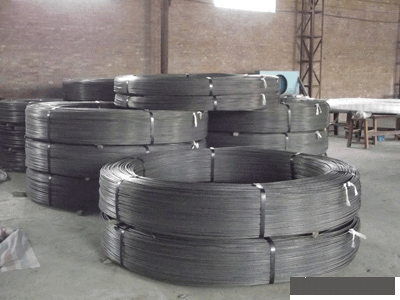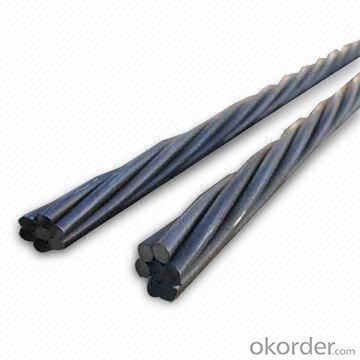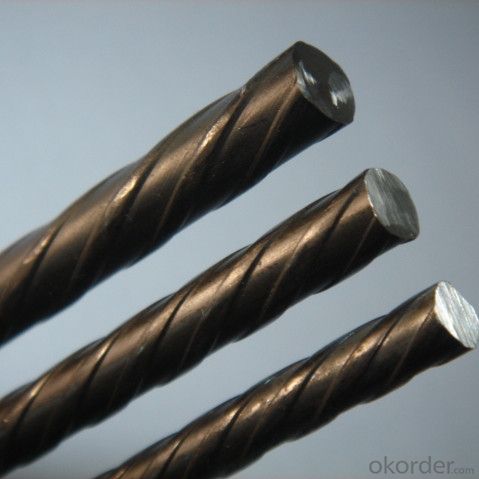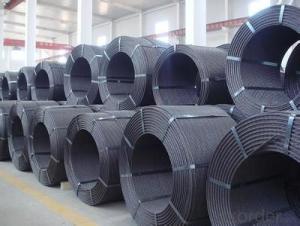High Tensile Steel Wire with Spiral Ribs
- Loading Port:
- China main port
- Payment Terms:
- TT or LC
- Min Order Qty:
- 20 m.t.
- Supply Capability:
- 3000 m.t./month
OKorder Service Pledge
OKorder Financial Service
You Might Also Like
1、Structure of High Tensile PC Steel Wire with Spiral Ribs Description:
Prestressed Concrete Steel Wire, also named PC steel wire orPC wire, is made from high carbon steel with low relaxation high tensile strength. PC wires are sorted into plain surface PC wire, spiral ribs PC wire and indented PC wire. They are commonly used for concrete structure reinforcement such as highway, high-speed railway projects, large-span bridges, overhead crane beam, coal mines.
2、Main Features of High Tensile PC Steel Wire with Spiral Ribs:
•Perfect cohesion. Spiral ribs and indented surface can strengthen the bond between wire and concrete, thus it improves the performance of the PC products and extends its life.
•Low relaxation high tensile strength. With low relaxation 2.5% and tensile strength up to 1860Mpa.
3、High Tensile PC Steel Wire with Spiral Ribs Images:



4、High Tensile PC Steel Wire with Spiral Ribs Specification:
Quick Details
Steel Grade: 77B or 82B high carbon wire rod
Standard: GB
Wire Gauge: 4.0mm to 10.0mm
Place of Origin: Tianjin, China (Mainland)
Type: PC
Application: Construction
Model Number: 4.0mm to 10.0mm
Packaging & Delivery
| Packaging Details: | Each coil is strapped by steel bands and fully wrapped in anti-rust paper & P.P woven sheet. |
|---|---|
| Delivery Detail: | within three week after confirm the order or contract. |
The character of the spiral ribs wire is there are 3-6 protruding ribs on the surface.
The new product was invented by Silvery Dragon in 1991, and the research program of the product includes spiral drawing die, spiral deforming technique etc. 12 proprietary technologies. The product is characteristic of 3 to 6 spiral ribs through spiral deforming drawing on the surface of wire, increasing the bond ability with concrete and raising PC products properties. Since 1997, spiral rib PC wire has already fully took place of indented PC wire, and it has been applied in PC telegraph pole, PC hollow floor plate, PC sleeper, high-speed railway PC sleeper plate, PC water supply pipe etc. Since 1996, it has already been exported to the overseas market. In 2006, the product passed the examination and certificate on the properties by German TU Munich; now the product is applied by Great Britain, Ireland, Bangladesh, German, Poland, etc. more than 30 countries. The production of the product is according to Chinese GB/T5223-2002. Except the shape, other standards for mechanical properties are interchangeable with those popular in the world, or we can use the reasonable standard after consulting with customers.
5、FAQ of High Tensile PC Steel Wire with Spiral Ribs:
①How is the quality of your products?
Our products are manufactured strictly according to national and internaional standard, and we take a test on every pipe before delivered out. If you want see our quality certifications and all kinds of testing report, please just ask us for it.
Guaranteed: If products’ quality don’t accord to discription as we give or the promise before you place order, we promise 100% refund.
②How about price?
Yes, we are factory and be able to give you lowest price below market one, and we have a policy that “ for saving time and absolutely honest business attitude, we quote as lowest as possible for any customer, and discount can be given according to quantity”,if you like bargain and factory price is not low enough as you think, just don’t waste your time.Please trust the quotation we would give you, it is professional one.
③Why should you chose us?
Chose happens because of quality, then price, We can give you both.Additionally, we can also offer professional products inquiry, products knowledge train(for agents), smooth goods delivery, exellent customer solution proposals.Our service formula: good quality+good price+good service=customer’s trust
SGS test is available, customer inspection before shipping is welcome, third party inspection is no problem.
Any question, pls feel free to contact us !
- Q:How long do steel pipes typically last?
- Steel pipes typically have a lifespan of 50 to 100 years, depending on various factors such as the quality of the steel, installation conditions, maintenance, and exposure to corrosive elements.
- Q:What is the maximum temperature that steel pipes can withstand?
- The maximum temperature that steel pipes can withstand depends on the grade and type of steel used. However, generally, carbon steel pipes can withstand temperatures up to 816°C (1,500°F), while stainless steel pipes can withstand higher temperatures up to 1,200°C (2,192°F) or even more, depending on the alloy.
- Q:How do you calculate the pipe flow rate for steel pipes?
- To calculate the pipe flow rate for steel pipes, you can use the Hazen-Williams equation or the Darcy-Weisbach equation. These equations take into consideration factors such as the pipe diameter, length, roughness, and the pressure difference between the two ends of the pipe. By plugging in these values into the respective equation, you can determine the flow rate of the fluid passing through the steel pipe.
- Q:Can steel pipes be used for underground compressed air pipelines?
- Yes, steel pipes can be used for underground compressed air pipelines. Steel pipes are commonly used for underground pipelines due to their strength and durability. They have the ability to withstand high pressure and can resist corrosion and other environmental factors. Steel pipes are also known for their long lifespan, making them a reliable choice for compressed air pipelines. However, it is important to ensure that the steel pipes are properly coated and protected to prevent any potential corrosion issues. Additionally, proper installation and maintenance of the pipelines are crucial to ensure their efficiency and safety.
- Q:What is the process of coating steel pipes?
- The process of coating steel pipes involves several steps. First, the pipes are cleaned to remove any dirt, rust, or other contaminants. Then, a primer is applied to enhance adhesion and provide a protective layer. Next, the pipes are coated with a specialized coating material, such as epoxy, polyethylene, or zinc, depending on the desired level of corrosion resistance. This coating is applied using various methods, including spraying, dipping, or wrapping. Finally, the coated pipes undergo a curing process, which allows the coating to harden and form a durable barrier against corrosion.
- Q:How are steel pipes used in the construction of railways and transportation systems?
- Steel pipes are commonly used in the construction of railways and transportation systems for various purposes. One major use of steel pipes in these applications is for the construction of bridges and tunnels. Steel pipes are often used as structural components in the construction of bridges, providing support and stability to the overall structure. In tunnels, steel pipes are used as ventilation shafts, allowing for the circulation of air and removal of fumes, thus ensuring the safety of passengers and workers. Additionally, steel pipes are used for the construction of railway tracks. They are used as supports for the tracks, providing a stable base for the trains to travel on. Steel pipes used in railway tracks are typically coated or galvanized to protect them from corrosion and ensure their longevity. Moreover, steel pipes are used for drainage systems in railway stations and transport hubs, ensuring proper water management and preventing flooding. Another important application of steel pipes in transportation systems is for the construction of signposts and streetlights. Steel pipes are often used as the main structural element in these structures, providing strength and durability. They can be easily fabricated and shaped to meet the specific design requirements, making them a popular choice for these applications. Overall, steel pipes play a crucial role in the construction of railways and transportation systems by providing structural support, ensuring proper ventilation, facilitating drainage, and serving as the main components in various structures. Their strength, durability, and versatility make them an ideal choice for these applications, contributing to the safe and efficient operation of transportation networks.
- Q:Can steel pipes be used for conveying food and beverages?
- Steel pipes can be used for conveying food and beverages, but certain precautions need to be taken to ensure their safety and suitability for this purpose. Firstly, it is important to choose food-grade stainless steel pipes that are specifically designed for handling food and beverage products. These pipes are made from high-quality stainless steel that is resistant to corrosion and does not leach harmful substances into the food or beverage. Secondly, the pipes should be properly cleaned and sanitized before and after each use to maintain hygiene standards. Regular cleaning and maintenance will prevent the accumulation of bacteria or contaminants that could potentially contaminate the food or beverage being transported. Additionally, it is crucial to consider the compatibility of the food or beverage with the steel pipes. Certain acidic or corrosive substances may react with the steel, causing contamination or compromising the integrity of the pipes. In such cases, alternative materials like food-grade plastic or rubber may be more suitable. Overall, steel pipes can be used for conveying food and beverages, but it is essential to ensure the use of food-grade stainless steel pipes, proper cleaning and sanitization, and compatibility with the specific food or beverage being transported. Following these guidelines will help maintain the safety and quality of the food or beverage during transportation.
- Q:How are steel pipes used in the construction of railways?
- Steel pipes are commonly used in the construction of railways for various purposes. They are primarily used in the fabrication of track structures, such as track supports, bridge components, and culverts. Steel pipes provide strength, durability, and resistance to external factors like corrosion and extreme weather conditions. They are also used for the transportation of fluids, such as water or fuel, within the railway infrastructure, ensuring efficient operation and maintenance of the system.
- Q:What are the different types of steel pipe coatings for corrosive environments?
- There are several types of steel pipe coatings specifically designed for corrosive environments. Some common options include fusion-bonded epoxy (FBE) coatings, liquid epoxy coatings, polyethylene (PE) coatings, and polyurethane (PU) coatings. These coatings provide a protective layer to prevent corrosion and extend the lifespan of the steel pipes in various corrosive conditions.
- Q:What are the different types of steel pipes available in the market?
- There are several different types of steel pipes available in the market, each designed for specific purposes and applications. Some of the most common types include: 1. Carbon Steel Pipes: These are the most widely used type of steel pipes, known for their strength and durability. They are primarily used for transporting fluids and gases in various industries such as oil and gas, construction, and plumbing. 2. Alloy Steel Pipes: These pipes are made by combining different metals, such as chromium, nickel, or molybdenum, with carbon steel. Alloy steel pipes offer enhanced strength, corrosion resistance, and heat resistance. They are often used in high-pressure applications, such as in power plants and chemical plants. 3. Stainless Steel Pipes: Stainless steel pipes are highly resistant to corrosion and oxidation, making them suitable for applications where hygiene and durability are crucial. They are commonly used in industries like food processing, pharmaceuticals, and water treatment. 4. Galvanized Steel Pipes: These pipes are coated with a layer of zinc to protect them from rust and corrosion. Galvanized steel pipes are commonly used in plumbing systems and outdoor structures, such as fences and handrails. 5. Seamless Steel Pipes: Seamless pipes are produced without any welding or joints, resulting in a smooth and continuous surface. They are known for their high strength and are often used in high-pressure applications. 6. Welded Steel Pipes: Welded pipes are made by rolling or bending a flat steel plate into a cylindrical shape and then welding the edges together. They are commonly used in industries such as construction, oil and gas, and automotive. 7. ERW (Electric Resistance Welded) Steel Pipes: ERW pipes are made by passing a high-frequency electrical current through the steel strip, causing it to heat and form a weld. They are widely used in various applications, including plumbing, water wells, and structural support. 8. LSAW (Longitudinal Submerged Arc Welded) Steel Pipes: LSAW pipes are made by bending and welding steel plates into a cylindrical shape. They are commonly used for transporting large volumes of oil, gas, or water over long distances. These are just a few examples of the diverse range of steel pipes available in the market. The choice of the right type of steel pipe depends on factors such as the intended application, environmental conditions, and budget considerations. It is important to consult with experts or professionals to determine the most suitable type of steel pipe for a specific project or application.
1. Manufacturer Overview |
|
|---|---|
| Location | |
| Year Established | |
| Annual Output Value | |
| Main Markets | |
| Company Certifications | |
2. Manufacturer Certificates |
|
|---|---|
| a) Certification Name | |
| Range | |
| Reference | |
| Validity Period | |
3. Manufacturer Capability |
|
|---|---|
| a)Trade Capacity | |
| Nearest Port | |
| Export Percentage | |
| No.of Employees in Trade Department | |
| Language Spoken: | |
| b)Factory Information | |
| Factory Size: | |
| No. of Production Lines | |
| Contract Manufacturing | |
| Product Price Range | |
Send your message to us
High Tensile Steel Wire with Spiral Ribs
- Loading Port:
- China main port
- Payment Terms:
- TT or LC
- Min Order Qty:
- 20 m.t.
- Supply Capability:
- 3000 m.t./month
OKorder Service Pledge
OKorder Financial Service
Similar products
New products
Hot products
Related keywords































